
Sparklers aren’t as safe as you might think! The lit tips burn at temps up to 2000 degrees Fahrenheit, and can cause burns and start fires. Take care with sparklers and don’t let small children handle them!
Fireworks can make any celebration special and have become an important part of many Michigander’s July 4th holidays. However, handling fireworks requires a commitment to safety. To ensure your festivities are both thrilling and secure, it’s important to follow some simple but essential safety guidelines.
If you’ve suffered a burn or other firework-related injury, both Lakes Urgent Care locations are equipped to treat you quickly, no appointment needed! Here are some common-sense fireworks safety tips to keep in mind this year:
1. Buy Your Fireworks from Trusted Sources
When purchasing fireworks, always opt for licensed and reputable vendors and established retailers. These sellers comply with safety regulations and offer quality products. Avoid buying fireworks from street vendors, parking lot tents, or unauthorized sources, as their products may be unsafe and unreliable.
2. Maintain a Safe Distance
Always keep a safe distance from fireworks during ignition. Adhere to the recommended distance on the packaging—typically at least 30 meters (100 feet) for smaller fireworks and more for larger ones. Be mindful of wind conditions that could affect the fireworks’ path and adjust your distance accordingly.
3. Wear Protective Gear
Protective gear is essential for personal safety. Wear safety glasses and gloves to shield yourself from potential hazards. Avoid loose clothing that can easily catch fire. When lighting fireworks, never lean over them and maintain a steady stance to prevent accidents.
4. Keep Water and Safety Equipment Nearby
Prepare for emergencies by having a bucket of water, a hose, or a fire extinguisher close at hand. This equipment allows you to quickly address any unexpected fires. If a minor fire occurs, douse it with water immediately. If the fire becomes unmanageable, call emergency services right away.
5. Supervise Children and Pets
Always supervise children and pets during firework displays. Never allow children to handle or light fireworks. Keep pets indoors or in a safe area to protect them from the noise and potential dangers.
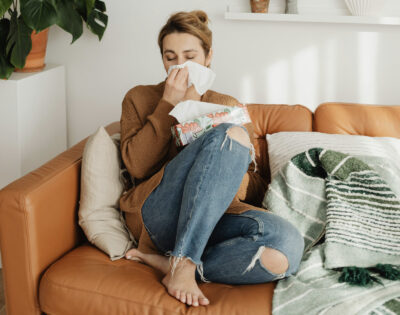 According to the Associated Press, our mild winter has resulted in an earlier than usual start to the spring allergy season. If you suffer from spring allergies, here are some tips to keep those symptoms at bay:
According to the Associated Press, our mild winter has resulted in an earlier than usual start to the spring allergy season. If you suffer from spring allergies, here are some tips to keep those symptoms at bay:
If you have a medication plan that worked for you last year, now is the time to resume it.
“If you are experiencing allergy symptoms for the first time, are unsure of the source of your allergies, or don’t have a clear idea about which medications can best help you, come see us at Lakes Urgent Care,” said medical director Dr. Haidar Al-Saadi. “We can help determine what types of allergens trigger your symptoms, establish a treatment plan, and help you monitor its effectiveness. If your Lakes Urgent Care provider feels that you could benefit from immunotherapy treatment (allergy shots), he or she will recommend a allergy specialist. Allergy shots won’t cure you of your allergies, but they will help mitigate the symptoms in the long run.”
Our sensitivities to allergens can change over time. You may have had allergies as a child and have now outgrown them and vice versa. Time magazine just published an excellent and comprehensive article that will help you better understand your allergy symptoms.
Spring Allergy Season: Treatment and Prevention Tips
Starting your treatment plan now helps prevent early inflammation and the cascade of allergic reactions that can spiral out of control.
Pollen levels will escalate as our weather warms and the plant life around us comes back to life. Here’s a website to help you track daily pollen levels in our area.
Prevention is always worth a pound of cure! If you can determine the specific allergens that trigger your symptoms, this can help you reduce or potentially eliminate exposure to the elements that cause you grief.
If tree pollen is your source of misery, it may not be possible to eliminate exposure. In your home, keep windows closed and rely on your home’s heating and cooling system along with good quality HEPA air filters and dehumidifiers to reduce symptoms while indoors or sleeping. When coming in from any outdoor activity, showering and changing your clothes can help reduce your exposure to allergens.
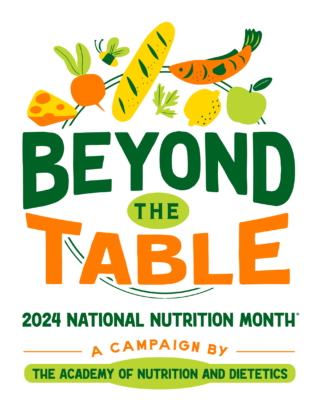
Each year, the Academy of Nutrition and Dietetics recognizes the month of March as National Nutrition Month.®, which started in 1973 as National Nutrition Week and became a month-long observance in 1980 in response to growing interest in nutrition.
The goal of National Nutrition Month.®
The 2022 White House Conference on Hunger, Nutrition, and Health highlighted the fact that millions of Americans face hurdles when it comes to accessing healthy food — and far too many are at risk of experiencing diet-related diseases like diabetes, obesity, and hypertension. The goal of National Nutrition Month.® is to raise awareness about the importance of making informed food choices and developing healthy eating and physical activity habits. The campaign emphasizes the significance of nutrition education and provides resources to help individuals make healthier food choices and lead healthier lifestyles.
“Lakes Urgent Care supports the efforts of the Academy of Nutrition and Dietetics to highlight awareness around healthier eating and increased fitness.” said Haidar Al-Saadi Medical Director at Lakes Urgent Care. “Too many in our community struggle with access to heatlhy food, and there’s more all of us can do to raise awareness.”
This year’s theme is “Beyond the Table,” which addresses “the farm-to-fork aspect of nutrition, from food production and distribution to navigating grocery stores and farmers markets — and even home food safety and storage practices. It also describes the various ways we eat — not only around a dinner table, but also on the go, in schools and restaurants, at games and events. This theme also includes sustainability, for instance, decreasing food waste from school and work to home and beyond.”
Learn more at eatright.org
 The CDC is reporting increased cases of norovirus in our area and across the country. Norovirus is highly contagious, and the symptoms include vomiting and diarrhea. “Other than making sure you are well hydrated, there is no other specific treatment for norovirus,” said Lakes Urgent Care medical director Dr. Haidar Al-Saadi. “We can’t give you a z pack and make you feel better if you have norovirus. That’s why prevention is by far your best approach to avoiding this nasty illness. And the number one thing you can do is wash your hands frequently and thoroughly.”
The CDC is reporting increased cases of norovirus in our area and across the country. Norovirus is highly contagious, and the symptoms include vomiting and diarrhea. “Other than making sure you are well hydrated, there is no other specific treatment for norovirus,” said Lakes Urgent Care medical director Dr. Haidar Al-Saadi. “We can’t give you a z pack and make you feel better if you have norovirus. That’s why prevention is by far your best approach to avoiding this nasty illness. And the number one thing you can do is wash your hands frequently and thoroughly.”
Proper hand washing involves soap, water and vigorous hand washing for at least twenty seconds. The friction of your hands rubbing together is an important part of keeping your hands clean. According to the CDC, “hand sanitizer does not work well against norovirus. You can use hand sanitizer in addition to hand washing, but hand sanitizer is not a substitute for handwashing, which is best.”
Always wash your hands after using the toilet, changing a diaper, or disposing of pet waste. Always wash your hands before eating, preparing, or handling food and before handling medicine.
Another important way to prevent the spread of norovirus is to use disinfectant wipes regularly in all the “high touch areas” of your home: door and drawer handles, light switches, and doorknobs.
As our Michigan temperatures dip into the teens and lower, not dressing properly or staying in the cold too long can be dangerous. Here are some tips to keep yourself and your family safe during the cold weather season.
“When temperatures are in the teens or lower, be sure to cover all of your extremities,” said Dr. Haidar Al-Saadi, Lakes Urgent Care medical director. “Be aware that the parts of your body farthest away from your heart are most susceptible to frost bite: your ears, nose, fingers, and toes are especially prone to frostbite.”
Dress in layers, keep every part of your body covered and be aware of the first signs of frostbite, which is called frost nip. Frostnip occurs before bite. If you picture your extremities in layers, frostnip happens when the first few layers of tissue are frozen. For frostbite, the entire body part, most commonly fingers and toes, is frozen through and tissue begins to die.
If you suspect frostnip or bite, run the extremity under warm water for 20 minutes. Never use hot water or rub the finger or toes to increase circulation. If, after 20 minutes, there is pain or no feeling at all, it’s time to head to a certified urgent care such as Lakes Urgent Care or the emergency department of your nearest hospital.
Prolonged exposure to cold weather can also lead to hypothermia, which occurs when your body begins to lose heat faster than it’s produced. Your body gives plenty of warning to get warmed up before serious problems set in. “We see hypothermia in our more vulnerable populations such as the elderly, those who are significantly immunocompromised, those with dementia and those with mental illness,” said Dr. Al-Saadi. “Depending on their mental status, they might not know they’re cold, which can lead to hypothermia.”
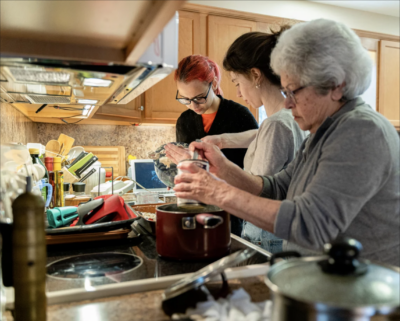 According to the American Red Cross, cooking is the number one cause of home fires. As the holiday season nears, the kitchen increasingly becomes the heart of the home, with family and friends gathering for meals and celebrations, and it’s easy to get distracted and make a mistake resulting in a cut or burn.
According to the American Red Cross, cooking is the number one cause of home fires. As the holiday season nears, the kitchen increasingly becomes the heart of the home, with family and friends gathering for meals and celebrations, and it’s easy to get distracted and make a mistake resulting in a cut or burn.
“For serious burns in the kitchen, a good rule of thumb is if blisters develop, it is likely a second degree burn, and you should seek medical attention right away,” said Lakes Urgent Care medical director, Dr. Haidar Al-Saadi. “For kitchen cuts, if the wound will not stop bleeding after a few minutes of applying direct pressure, it is likely that the wound will require more acute care and treatment. We can take care of minor burns and cuts easily and quickly, no appointment needed at either Lakes Urgent Care location in West Bloomfield or Livonia.”
Whether you’re a seasoned chef or a novice, these easy holiday kitchen safety tips from Lakes Urgent Care will keep you and your family safe this season:
- Make the kitchen a kids-free zone during holiday gatherings: children and pets can easily get underfoot or distract you and cause accidents. Consider using pet gates or other means to create a boundary. At the very least, keep them away from the stove!
- Don’t wear loose clothing or sleeves that dangle while cooking – that baggy Thanksgiving sweater with the 3D sequined turkey isn’t ideal when working around open flames.
- You’ve got knives and open flames – maybe take it easy on the cocktails!
- Install a smoke alarm in or near your kitchen, on each level of your home, near sleeping areas, and inside and outside bedrooms if you sleep with doors closed. Use the test button to check it each month. Replace all batteries at least once a year if your smoke alarm requires it.
- Purchase a fire extinguisher and keep it in an easy-to-reach location in your kitchen.
- If you are cooking anything on the stove top, never leave it unattended – stay in the kitchen. If you leave the kitchen for even a short period of time, turn off the stove top, or deputize a family member to keep watch for you.
- If there’s more than one person working the kitchen at one time, make sure to communicate clearly and be aware of your surroundings – always announce if you are walking behind someone, or if you’re carrying a hot pan or sharp knife, to avoid collisions.
- Keep anything that can catch fire – oven mitts, wooden utensils, paper or plastic bags, food packaging, towels or curtains – away from your stove, oven or any other appliance in the kitchen that generates heat.
- Always check the kitchen before going to bed or leaving the home to make sure all stoves, ovens, and small appliances are turned off.
If you ignore all of our advice and end up with a cooking-related injury this season, know that both of our Lakes Urgent Care locations in West Bloomfield and Livonia are open seven days a week, including holidays! We are fully capable of treating your kitchen knife cuts and minor burns quickly and professionally.
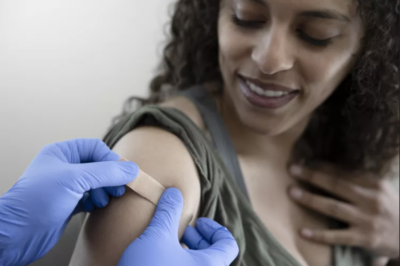
Let’s start with some good news: according to a recent article in Time magazine, the 2023 flu vaccine is expected to work well this year. By watching flu activity and effectiveness of this year’s vaccine in the southern part of the world, where the flu first appears each year, the World Health Organization found that the 2023 flu vaccine should be effective againstthis year’s flu virus.
“Getting a flu shot remains your best defense against serious illness and a possible trip to the hospital,” said Lakes Urgent Care medical director Dr. Haidar Al-Saadi. “There is absolutely no way that you can get the flu from getting a flu shot, And while there’s no guarantee that getting a flu shot will prevent you from getting the flu, your symptoms will likely be milder if you are vaccinated.”
Lakes Urgent Care makes it easy for you and everyone in your family to get a flu shot, no appointment needed at our West Bloomfield or Livonia locations.
In addition to the standard dose (appropriate for everyone six months and older), Lakes Urgent Care also offers a “high dose” version which is recommended for adults over the age of 65. This vaccine is comprised of 3 types of flu strains in the formulation (known as trivalent).
Current medical recommendations indicate that it’s best to get your flu shot sometime after October 1st.
In particular, patients over the age of 65 may be negatively impacted by getting the flu vaccine too early in the season. The vaccine stimulates our immune systems to create antibodies to fight against influenza. However, those antibodies may have a limited period of effectiveness. If the vaccine is provided too early in the season, it may lose some of this effectiveness if we experience a late flu season. The flu season typically begins around November or December, with peak activity in January and February. Should there be a slight delay in that pattern, it’s possible that the vaccine’s effectiveness may not be as good as it could have been if provided too early in the season, say in August or September.
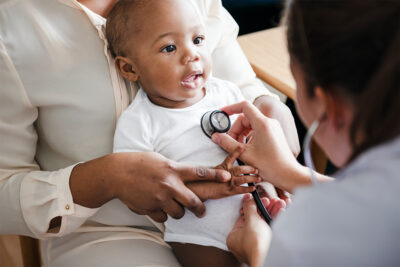 A rapid RSV test that delivers results in ten minutes is now available at Lakes Urgent Care in West Bloomfield and Livonia. RSV (Respiratory Syncytial Virus) is a very contagious infection that affects the respiratory tract. In addition to being very contagious, RSV is also very common. Usually, RSV symptoms are mild and feel like a common cold.
A rapid RSV test that delivers results in ten minutes is now available at Lakes Urgent Care in West Bloomfield and Livonia. RSV (Respiratory Syncytial Virus) is a very contagious infection that affects the respiratory tract. In addition to being very contagious, RSV is also very common. Usually, RSV symptoms are mild and feel like a common cold.
“For most of us, RSV testing is not needed,” said Lakes Urgent Care medical director Dr. Haidar Al-Saadi. “Just like a cold, your symptoms will be gone in a few days. But if you have an infant at home who seems to be having a hard time breathing, is not eating, or is not moving normally, these may be symptoms of RSV and we recommend having your child tested.”
RSV can also lead to serious breathing problems for adults older than 65, those with heart or lung disease, or those with a compromised immune system. “If you fit any of these categories and you are experiencing severe breathing issues, wheezing, and/or have a fever, you should get tested,” said Dr. Al-Saadi.
Our rapid RSV test will provide results within 10 minutes. “If the test is positive, says Dr. Al-Saadi, “we will make a determination if hospitalization is needed. There is no medication that needs to be taken, but if you don’t need hospitalization, we will provide advice on how to manage through it at home.”
Here are some tips to help you and your family stay safe and enjoy another great Michigan Summer:

Protect yourself from the sun: While choosing the best sunscreen is important, even more crucial is using it correctly — something a lot of us don’t do. Sunscreen is best applied before going outdoors and before planned activity. Once outdoors, it is best to reapply sunscreen again following swimming or participating in an activity where you may sweat. Although some sunscreen products claim they remain effective after swimming, it is always best to reapply sunscreen after drying off. The FDA defines water-resistant sunscreen as meaning that the SPF level stays effective after 40 minutes in the water. Sunscreens are in no way waterproof, so you’ll need to reapply them regularly after you take a dip.
Wearing a hat and sunglasses with UV-A and UV-B type filtering and some sun protection clothing is always recommended which is more effective than just sunscreen alone.
Hydrate: Most of us don’t drink enough water every day and there are plenty of benefits to making sure you are well-hydrated. Eight glasses of water a day is the right amount for some people, but depending on your weight and age, you may need more. The medical research center at the Mayo Clinic devised a formula to help you to come up with your own optimal daily water consumption amount: divide your weight by 2.2. Multiply that number by your age. Finally, divide that sum by 28.3. For example, if you weigh 170 pounds and are 50 years old, you should consume 136 ounces of water each day which equals 17 eight ounce cups. This may seem like a lot of water, but remember that coffee, juice, and the water in fruits and vegetables also count towards this amount. Coffee does not cause dehydration, but drinking alcohol will dehydrate your body.
 Keep the mosquitos away: At best, mosquitoes are incredibly annoying and make us itchy. At worst, they can spread disease. To keep them away, start by making sure that there is no standing water on your property our near where you gather outdoors.
Keep the mosquitos away: At best, mosquitoes are incredibly annoying and make us itchy. At worst, they can spread disease. To keep them away, start by making sure that there is no standing water on your property our near where you gather outdoors.
One simple and inexpensive solution is something called a “mosquito dunk.” They have pros and cons, so read this article about mosquito dunks first before you decide if they are right for your property.
A more expensive, but well-rated mosquito deterrent is the Thermacell. This unit works well for keeping mosquitos away when relaxing at night on an outdoor patio or deck.
If you are out and about when mosquitoes are most active, consider wearing light fabric clothing that covers your arms and legs and/or applying a good mosquito repellent. Studies have shown that mosquitoes are more attracted to dark colored clothing. “Mosquitoes really like dark, black colors,” Jeff Riffell, Ph.D., a biology professor at the University of Washington and one of the study’s authors. “What that might indicate is that they are really sensitive to desiccation or losing water, and so they want to find dark, shady areas to rest.” You can learn more about mosquitos and how to keep them at bay in this article from VERIFY.
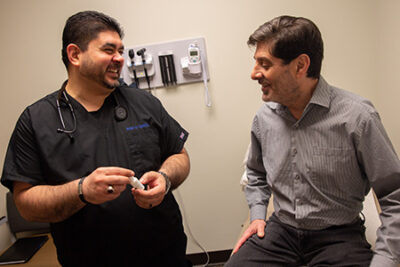
According to recent articles in the Washington Post, Forbes and many other national media publications, the 2023 spring allergy season is starting earlier than ever due to the effects of climate change, which is changing the pattern of when trees, plants, and grass spring to life.
If you suffer from spring allergies, you’ll want to start taking your medication sooner than you might have in the past. Taking your medication before symptoms appear helps your body to keep the misery from getting out of hand. Check here for today’s pollen count in our area courtesy of Map My Air.
“We perform an assessment of your symptoms, prescribe a custom treatment plan, and are available for follow up care, said Lakes Urgent Care medical director Dr. Haidar Al-Saadi. “At Lakes Urgent Care, we can also make sure your symptoms are caused by allergies and not something else, like a deviated septum or sinus infection.”
Instead of guessing which over the counter medication is best for your unique symptoms, plan an annual visit with your primary care physician to review what you did the year before, what worked, and what didn’t. And you can always consult with us at Lakes Urgent Care any time, no appointment needed. If we saw you last year for allergy care, we can also review how things went and adjust your medication plan as needed for the 2023 spring allergy season.
“If spring allergies give you asthma symptoms, sustained use of bronchodilators such as albuterol have been widely proven to be both safe and effective.” said Dr. Al-Saadi.
Spring allergies are less severe in Detroit
Here’s some good news. If you suffer from spring allergy symptoms, you’ll be much less miserable here in metro Detroit than just about anywhere else in the country. According to a new study done by the Asthma and Allergy Foundation of America, out of 100 cities tested nationwide, metro Detroit was the sixth-best city for fewest allergens in the air, patient medication use, and patient access to an allergy specialist.
There are a few proactive things you can always do to minimize your spring allergy symptoms. In your home, keep windows closed and rely on your home’s heating and cooling system along with good quality air filters and dehumidifiers to reduce symptoms while indoors or sleeping. When coming in from any outdoor activity, showering and changing your clothes can help reduce your exposure to allergens. If you can determine the specific allergens that trigger your symptoms, this can help you reduce or potentially eliminate exposure to the elements that cause you grief.